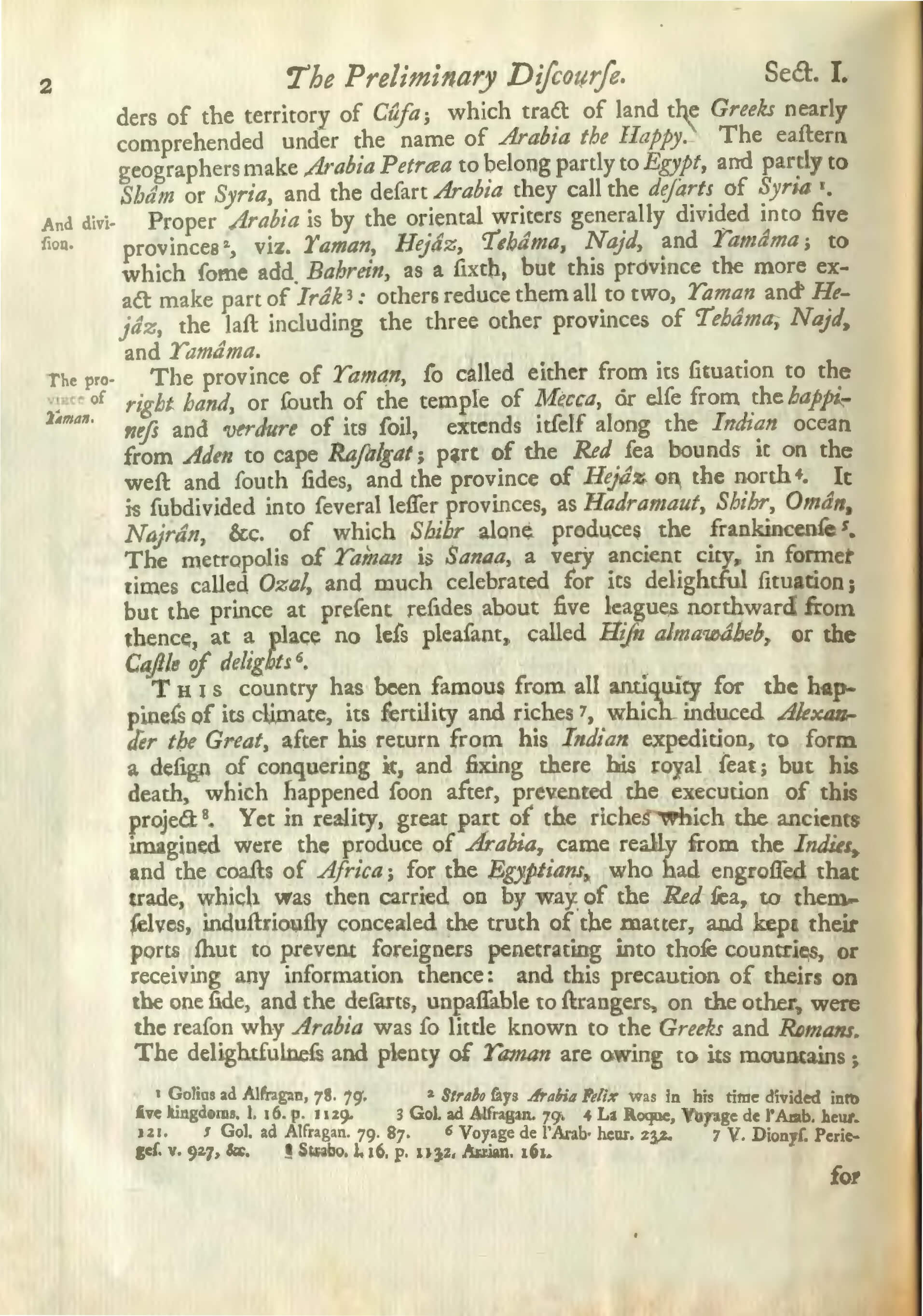George Sale, The Koran, commonly called the Alcoran of Mohammed, translated into English immediately from the original Arabic; with Explanatory Notes, taken from the most approved Commentators. To which is prefixed A Preliminary Discource (1734)
borders of the territory of Cûfa; which tract of land the Greeks nearly comprehended under the name of Arabia the Happy. The eastern geographers make Arabia Petræa to belong partly to Egypt, and partly to Shâm or Syria, and the defart Arabia they call the desarts of Syria 1.
And division.
Proper Arabia is by the oriental writers generally divided into five provinces 2, viz. Yaman, Hejâz, Tehâma, Najd, and Yamâma; to which some add Bahrein, as a sixth, but this province the more exact make part of Irâk 3: others reduce them all to two, Yaman and Hejâz, the last including the three other provinces of Tehâma, Najd, and Yamâma.
The province of Yaman.
The province of Yaman, so called either from its situation to the right hand, or south of the temple of Mecca, or else from the happiness and verdure of its soil, extends itself along the Indian ocean from Aden to cape Rasalgat; part of the Red sea bounds it on the west and south sides, and the province of Hejâz on the north 4. It is subdivided into several lesser provinces, as Hadramaut, Shibr, Omân, Najrân, &c. of which Shihr alone produces the frankincense 5. The metropolis of Yaman is Sanaa, a very ancient city, in former times called Ozal, and much celebrated for its delightful situation; but the prince at present resides about five leagues northward from thence, at a place no less pleasant, called Hisn almawâheb, or the Castle of delights 6.
This country has been famous from all antiquity for the happiness of its climate, its fertility and riches 7, which induced Alexander the Great, after his return from his Indian expedition, to form a design of conquering it, and fixing there his royal seat; but his death, which happened soon after, prevented the execution of this project 8. Yet in reality, great part of the riches which the ancients imagined were the produce of Arabia, came really from the Indies, and the coasts of Africa; for the Egyptians, who had engrossed that trade, which was then carried on by way of the Red sea, to themselves, industriously concealed the truth of the matter, and kept their ports shut to prevent foreigners penetrating into those countries, or receiving any information thence: and this precaution of theirs on the one side, and the defarts, unpassable to strangers, on the other, were the reason why Arabia was so little known to the Greeks and Romans. The delightfulness and plenty of Yaman are owing to its mountains;
1 Golius ad Alfragan, 78. 79.
2 Strabo says Arabia Felix was in his time divided into five kingdoms. l. 16. p. 1129.
3 Gol. ad Alfragan. 79.
4 La Roque, Voyage de l’Arab. heur. 121.
5 Gol. ad Alfragan. 79. 87.
6 Voyage de l’Arab. heur. 232.
7 V. Dionyf. Perieges. v. 927, &c.
8 Strabo. l. 16. p. 1132. Arrian. 161.
